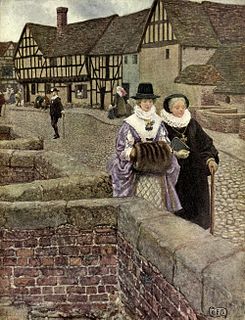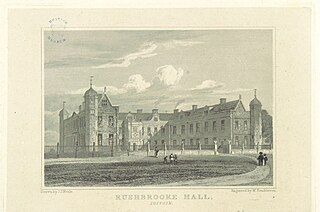Related Research Articles

Nicholas Yonge was an English singer and publisher. He is most famous for publishing the Musica transalpina (1588), a collection of Italian madrigals with their words translated into English. This proved to be explosively popular, beginning a vogue for madrigal composing and singing in England which lasted into the first two decades of the 17th century. Indeed, William Heather, founder of the music chair at Oxford University, included the book in his portrait, painted c. 1627, confirming the longevity of Musica transalpina's influence and popularity.

Thomas Ford was an English composer, lutenist, viol player and poet.

George Kirbye was an English composer of the late Tudor period and early Jacobean era. He was one of the members of the English Madrigal School, but also composed sacred music.
John Wilbye was an English madrigal composer.
Robert Jones was an English lutenist and composer, the most prolific of the English lute song composers.
Thomas Bateson, Batson or Betson was an Anglo-Irish writer of madrigals in the early 17th century.
Francis Pilkington was an English classical composer, lutenist and singer, of the Renaissance and Baroque period. Pilkington received a B.Mus. degree from Oxford in 1595. In 1602 he became a singing man at Chester Cathedral and spent the rest of his life serving the cathedral. He became a minor canon in 1612, took holy orders in 1614 and was named precentor of the cathedral in 1623. Although he was a churchman, Pilkington composed largely secular music—ayres, madrigals, and lute songs. He died in Chester.
John Ward (1590–1638) was an English composer. He trained as a singer in Canterbury and moved to London where he produced religious and secular works. Ward's compositions, some of which were published in his lifetime, consist of madrigals, works for viol consort and Anglican church music. His madrigals are remarkable for their fine texts, broad melodic lines and originality.
John Bennet was a composer of the English madrigal school. Little is known for certain of Bennet's life, but his first collection of madrigals was published in 1599.

William Beale was an English composer and baritone.
The year 1604 in music involved some significant events.
Martin Peerson was an English composer, organist and virginalist. Despite Roman Catholic leanings at a time when it was illegal not to subscribe to Church of England beliefs and practices, he was highly esteemed for his musical abilities and held posts at St Paul's Cathedral and, it is believed, Westminster Abbey. His output included both sacred and secular music in forms such as consort music, keyboard pieces, madrigals and motets.
Henry Youll (fl.1608) was an English madrigalist and composer active in Suffolk. His work included Canzonets to Three Voyces. In recent times it has been published by Stainer & Bell, and recitals and recordings of the music have been made by madrigal groups worldwide.
Robert Dowland was an English lutenist and composer. He was the son of the lutenist and composer John Dowland. Throughout his lifetime he wrote almost 90 lute songs and other pieces written for the lute.

William Jackson, referred to as Jackson of Exeter, was an English organist and composer.
John Broderip (1719–1770) was an English organist.
Robert Broderip was an English organist and composer.
Thomas East,, was an English printer who specialised in music. He has been described as a publisher, but that claim is debatable. He nevertheless made an important contribution to musical life in England. He printed the significant madrigal collection, Musica Transalpina, which appeared in 1588.
Thomas Vautor was an English musician, known as a composer of madrigals.
Jeremy or Jeremiah Savile was an English musician in London under the Commonwealth. He taught the voice and viol, and composed songs.
References
- Edmund Horace Fellowes (2007 reprint), The English Madrigal Composers, pp. 264–5.